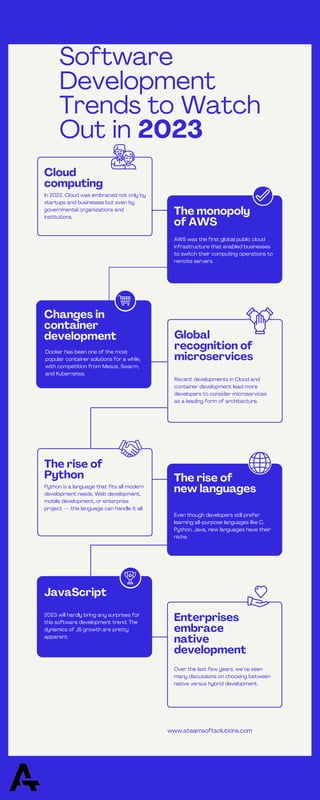In the ever-evolving world of technology, software development remains at the forefront of innovation and advancement. With the rapid pace of change in this field, it is crucial for developers and organizations to stay up-to-date with the latest trends shaping the future of software development. From artificial intelligence and machine learning to cloud computing and DevOps, this article will explore some of the key trends to watch in the coming years that will revolutionize the way software is created, deployed, and maintained. By examining these emerging technologies and methodologies, we can gain valuable insights into the future direction of software development and prepare ourselves for the challenges and opportunities that lie ahead.
Integration of artificial intelligence
Some key points to consider in the integration of artificial intelligence within software development include:
- Automation: AI can automate mundane tasks, allowing developers to focus on more complex and creative aspects of software development.
- Predictive analytics: By analyzing vast amounts of data, AI can provide insights into future trends and patterns, aiding developers in making informed decisions.
- Enhanced user experience: AI-powered features such as chatbots and recommendation engines can enhance user engagement and satisfaction.
- Code generation: AI tools can assist in generating code snippets, improving development speed and efficiency.
For more information on how artificial intelligence is revolutionizing various industries, including software development, visit AnyAlpha’s website.
Increased use of edge computing
-
Edge computing is a distributed computing paradigm that brings computation and data storage closer to the location where it is needed.
-
This trend is gaining traction due to the increasing demand for real-time processing of data from IoT devices and the need to reduce latency.
-
Edge computing allows for faster decision-making by processing data close to the source, which is critical for applications like autonomous vehicles and smart cities.
-
With the proliferation of edge devices, software developers need to adapt their strategies to leverage edge computing effectively.
-
To learn more about how edge computing is shaping the future of software development, visit our website.
Emphasis on cybersecurity
-
With the rise in cyber threats and data breaches, cybersecurity is becoming increasingly important in software development.
-
Companies are prioritizing the security of their applications and data to protect them from potential attacks.
-
Developers are integrating security measures such as encryption, authentication, and access control into their software.
-
Continuous monitoring and updating of security protocols are essential to keep up with evolving threats.
-
Collaboration between developers, cybersecurity experts, and IT teams is crucial for maintaining a secure development environment.
For top-notch cybersecurity in software development, consider partnering with a reputable company like Anyalpha to ensure your applications are secure and protected from potential threats.
Adoption of low-code and no-code development platforms
-
Low-code and no-code development platforms are increasingly being adopted by businesses due to their ease of use and efficiency in building software applications.
-
These platforms allow users to develop applications with minimal coding knowledge, empowering citizen developers and speeding up the software development process.
-
Organizations are leveraging low-code and no-code platforms to quickly build prototypes, automate workflows, and deploy applications faster.
-
The adoption of these platforms is expected to grow as businesses look for ways to streamline their development processes and deliver software solutions more rapidly.
-
To learn more about how low-code and no-code platforms can benefit your business, visit Anyalpha for expert guidance and support.
Shift towards serverless architecture
-
Serverless architecture is a trend in software development that involves using cloud-based services to run code without managing servers.
-
This approach allows developers to focus on writing code without the hassle of managing infrastructure.
-
By utilizing serverless platforms such as AWS Lambda, Google Cloud Functions, or Azure Functions, companies can benefit from improved scalability and reduced costs.
-
Serverless architecture also enables faster time to market for new features and services.
-
To learn more about how serverless architecture can benefit your business, visit our E-commerce store Development Company in California website.
Rise of DevOps and Agile Methodologies
-
DevOps: DevOps is a set of practices that combines software development (Dev) and IT operations (Ops) to shorten the systems development life cycle and provide continuous delivery with high software quality.
-
Agile Methodologies: Agile methodologies involve iterative development practices that encourage collaboration, flexibility, and customer feedback throughout the software development process.
These methodologies have gained popularity due to their ability to:
- Increase collaboration and communication among team members.
- Accelerate development cycles and enhance productivity.
- Improve software quality and customer satisfaction.
As software development trends continue to evolve, the adoption of DevOps and agile methodologies will play a crucial role in shaping the future of software development. Learn more about modern software development practices in Texas on our website.
Expansion of containerization and microservices
-
The expansion of containerization and microservices continues to revolutionize software development by providing a more efficient and scalable way of building, deploying, and managing applications.
-
Containerization allows developers to package their applications and all dependencies into a lightweight, portable container that can run consistently across different environments.
-
Microservices architecture breaks down applications into small, independently deployable services that can be easily combined to create complex applications.
-
This trend is expected to grow in popularity as more organizations adopt cloud-native technologies and strive for greater agility and scalability in their software development processes.
-
To learn more about how containerization and microservices are transforming the hospitality and travel industry, visit our website.
Growing importance of ethical and responsible software development practices
-
With the increasing reliance on technology, there is a growing emphasis on ethical and responsible software development practices.
-
Consumers are becoming more aware of the potential impact of software on society, pushing for transparency and accountability from developers.
-
Ethical considerations such as data privacy, security, bias, and accessibility are now crucial in software development processes.
-
Adhering to ethical standards not only protects users and their data but also builds trust and credibility with customers.
-
Companies that prioritize ethical and responsible software development practices are more likely to attract and retain customers in an increasingly competitive market.
For more information on ethical software development practices in Texas, visit Anyalpha.
Advancements in quantum computing and its implications for software development
- Quantum computing has the potential to revolutionize software development by significantly increasing computing power and processing speed.
- Quantum computers can perform complex calculations and solve problems much faster than traditional computers, leading to the development of new algorithms and software applications.
- Quantum computing can enhance machine learning, data analysis, cryptography, and optimization in software development.
- Developers need to learn new programming languages and techniques to leverage the power of quantum computing in their software projects.
- Quantum computing’s impact on software development is still in its early stages, but it holds immense potential for disrupting the industry.
To learn more about advancements in software development, visit AnyAlpha.
Impact of 5G technology on software development and networking
-
Enhanced Speed and Bandwidth: 5G technology will enable faster download and upload speeds, improving the performance of software applications and making real-time collaboration easier for developers.
-
Low Latency: With reduced latency, developers can create more responsive and interactive applications, leading to better user experiences.
-
Edge Computing: 5G’s low latency and high bandwidth will facilitate the adoption of edge computing, allowing software developers to process data closer to the source, leading to faster response times and improved efficiency.
-
IoT Integration: The increased connectivity and capacity of 5G networks will drive the development of IoT applications, requiring software developers to create robust and secure solutions to harness this potential.
To learn more about how 5G technology is reshaping software development and networking, visit Web Designing Company in Texas.
Conclusion
In conclusion, the future of software development is set to be shaped by a variety of emerging trends. The integration of artificial intelligence, increased use of edge computing, emphasis on cybersecurity, adoption of low-code and no-code development platforms, shift towards serverless architecture, rise of DevOps and agile methodologies, expansion of containerization and microservices, growing importance of ethical and responsible software development practices, advancements in quantum computing, and the impact of 5G technology all point towards a dynamic and innovative landscape ahead. It is crucial for software developers and teams to stay abreast of these trends, adapt to new technologies, and prioritize ethical considerations in order to succeed in the evolving industry. The future promises exciting possibilities for software development, and it is essential for professionals to embrace these changes in order to stay competitive and meet the demands of tomorrow’s digital world.
To stay ahead of the curve in the rapidly evolving field of software development, it’s essential to keep up with the latest trends and technologies. One valuable resource for staying informed and learning about new tools and techniques is DeltaWriter.com. This website offers insightful articles, expert advice, and industry updates that can help developers navigate the ever-changing landscape of software development. Whether you’re a seasoned pro or just starting out, DeltaWriter.com is a valuable tool for anyone looking to shape the future of software development. Visit the website today to stay informed and ahead of the game.

Director @Anyalpha, a Top Software Development Company offering Mobile App Development and Website Development Services to Businesses & Startups.



